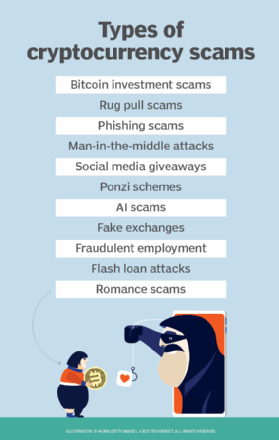Cryptocurrency Scams on the Rise
As cryptocurrency continues to grow in popularity, so do the scams associated with it. In 2024, cryptocurrency and bitcoin reached an all-time high, creating an urgency to invest and a corresponding rise in scammers trying to take advantage of this trend. The FBI’s Internet Crime Complaint Center reported losses of over $5.6 billion in 2023, with a 45% increase from 2022.
Types of Cryptocurrency Scams
- Bitcoin Investment Schemes: Scammers contact potential investors claiming to be experienced investment managers, promising high returns. They request an upfront fee and may ask for personal identification information.
- Rug Pull Scams: Scammers promote a new project or coin, gather funding, and then disappear with the money. Examples include fake initial coin offerings (ICOs) and non-fungible token (NFT) scams.
- Romance Scams: Scammers build trust with victims through online relationships and convince them to invest in cryptocurrency or send money.
- Phishing Scams: Scammers send emails with malicious links to gather personal details, such as cryptocurrency wallet key information.
- Man-in-the-Middle Attacks: Scammers intercept sensitive information when users log in to cryptocurrency accounts in public locations.
- Social Media Cryptocurrency Giveaway Scams: Scammers post fake giveaways on social media, asking victims to verify their accounts or provide personal information.
- Ponzi Schemes: Scammers pay older investors with money from new investors, promising high returns with little risk.
- Fake Cryptocurrency Exchanges: Scammers create fake exchanges, luring investors to deposit money.
- Employment Offers and Fraudulent Employees: Scammers impersonate recruiters or job seekers to gain access to cryptocurrency accounts.
- Flash Loan Attacks: Attackers manipulate pricing on decentralized finance platforms using flash loans.
- AI Scams: Scammers use AI chatbots to promote fake tokens or manipulate proof of work.
- Bitcoin ATM Scams: Scammers use ATMs to steal money from victims.
Protecting Against Cryptocurrency Scams
To avoid falling victim to cryptocurrency scams, be aware of red flags such as promises of large gains, requests for cryptocurrency payments, and misspellings or grammatical errors in communication. Practice good digital security habits, such as using strong passwords and secured connections. Never give wallet keys or access codes to anyone, and be cautious when receiving unsolicited emails or text messages.
Reporting Cryptocurrency Scams
If you believe you’ve seen a cryptocurrency scam or been a victim, report it to organizations such as the Commodity Futures Trading Commission (CFTC), Federal Trade Commission (FTC), Internet Crime Complaint Center (IC3), or U.S. Securities and Exchange Commission (SEC). Also, report the incident to the cryptocurrency exchange used for the transaction.



